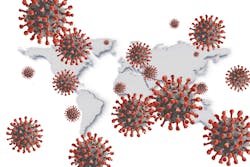The head of the World Health Organization (WHO) said global COVID-19 activity is at different stages in different parts of the world and warned of a long road ahead with the virus.
The global COVID-19 total has reached over 2,628,000 cases from 185 countries, along with more than 183,000 deaths, according to the Johns Hopkins online dashboard.
At a media telebriefing, Tedros Adhanom Ghebreysus, PhD, the WHO's director-general, said most of the epidemics in Western Europe have stabilized or are declining. However, there are worrying upward trends in Africa, Central and South America, and Eastern Europe, though numbers are still relatively low.
Most countries are still in the early stages of their epidemics, but some already-affected locations are seeing a resurgence. "Make no mistake: we have a long way to go. This virus will be with us for a long time," Tedros said.
He said social distancing steps have suppressed transmission in many countries, but the virus is still extremely dangerous, and early evidence suggests that most of the world is still susceptible. "That means epidemics can easily re-ignite," he said.
Another danger is complacency, and he said people are understandably frustrated with stay-at-home orders and the threat to their livelihoods. Though the WHO understands and shares the desire to return to normal life, there must be a "new normal" that is healthier, safer and better prepared, Tedros said.
Key steps in the response, such as finding and testing all suspected cases, should still be the backbone of the response, and it is also important to engage and empower people, he said.
When asked about protests against stay-at-home orders, Mike Ryan, MD, who leads the WHO's health emergencies program, said his work in different outbreak settings, including Ebola in the Democratic Republic of Congo, shows that a high level of trust between citizens and the government is key. "That's a valuable thing to have in the bank," he said. "They have to believe there's a plan, that there's a reason for doing this."
If plans and the rationale for response actions are murky, communications are vulnerable to be gamed and directed in counterproductive ways, Ryan said.
The process should be a two-way dialogue, which promotes transparency and ensures consistency so that people are not hearing different messages, he said, adding that civil society should also play a role so that not all communications are purely governmental.
Tedros said one of the WHO's tasks is to track countries' outbreak response progress, and though many who reported have strong capabilities, no single country has everything in place. For example, of countries reporting data to the WHO, 91 percent have the lab capacity to test for COVID-19, while 78 percent have response plans in place, and 76 percent have surveillance systems.
However, he said only 66 percent have clinical referral systems to care for COVID-19 patients. Less than half have community engagement plans, and less than half have infection prevention and control programs and standards for water, sanitation and hygiene in health facilities.
"In other words, there are still many gaps in the world's defenses," Tedros said. "WHO will continue working with countries and the international community to close these gaps and build sustainable capacities for now and the future."

